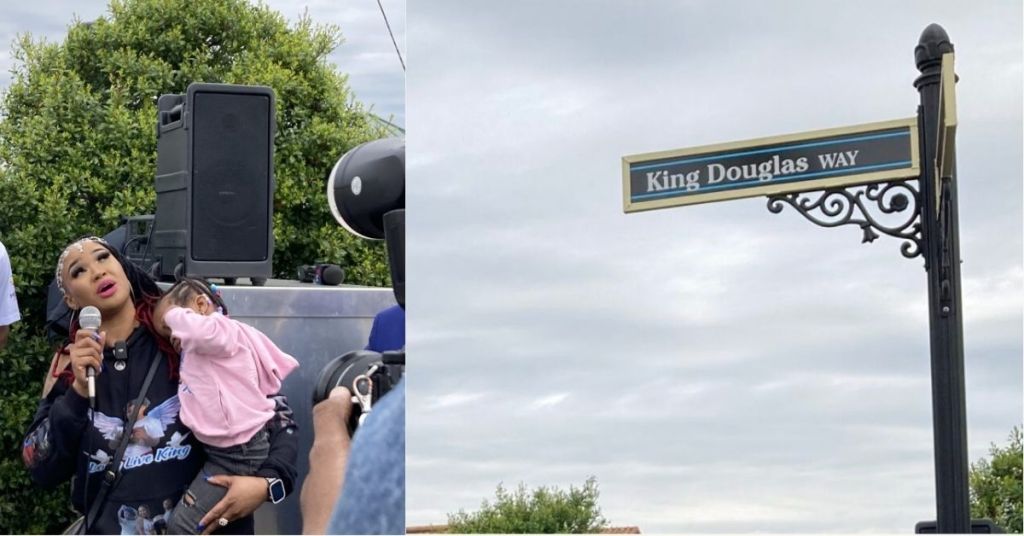By Steph Quinn
Capital News Service
Ja’Ka McKnight dances as she prepares to lead a procession to the street being named, on this April morning, after her late son, King Douglas. The crowd’s shouts rise in a gray morning that is slowly turning to spring sunshine.
“Long live King!” they sing out. “Long live King!”
It has been three years since her son’s murder and McKnight, 36, is trying to make those words true – to turn her child’s life into a hopeful legacy that will help others suffering the aftermath of gun violence in their Prince George’s County community.
The worst thing that can happen, she says, is for people to put it out of their minds, to try and live with the pain by suppressing it.
“People sweep it under the rug,” she says, “and so it affects them later on down the line. By that time, it’s too late.”
On this morning, she is turning the official street-naming ceremony into a celebration of King’s life. Every other day of the week, she is becoming a full-time community advocate, looking for every small way she can to help others confront the suffering.

Photo courtesy of Capital News Service
She invites more than a dozen kids over for movie nights, home-cooked meals and sleepovers. She helps them search for jobs and figure out what they want to do in life. McKnight said she’s like the “cool mom slash big sister.” She’s there for them to confide in, or when they want help doing the right thing.
She’s also become a sister to other moms who have lost sons.
“It’s just like a support group, where we’re supporting each other and just trying to just be there for one another,” she said. “It brings comfort to us to know that we’re not in it alone and that somebody just really understands us.”
This month marks the three-year anniversary of King’s death at 13, when he was fatally shot in a Prince George’s County parking lot near an arcade where McKnight had dropped him off to hang out with friends.
A 12-year-old boy confessed to shooting King during a fight with King’s friend over a girl. A judge ordered supervised probation for the boy, who said he didn’t mean to shoot King when his friend handed him a gun in that parking lot. But the sentence and the explanation provided no solace to McKnight.
In the years since King’s death, McKnight has had more encounters with the justice system than she’d ever imagined possible. She has talked with police, applied for victims’ compensation and sat in court hearings – for the boy who shot King and for children in foster care, whom she represents as a court appointed special advocate.
She has testified about her experience in committee hearings of the Maryland General Assembly. When lawmakers voted this month to expand the list of crimes that automatically send kids as young as 10 to the court system, McKnight agreed.
But that change wouldn’t have made much difference in the court hearing of her son’s killer, since violent crimes were already included on that list. And it wouldn’t have made it any easier for McKnight or King’s friends to find resources to work through what happened.
“It will help the next child, though,” McKnight said.
The street naming turned into a party to celebrate King’s life. There was a DJ onstage behind a giant photo of King surrounded by balloons. Facing the stage was a semicircle of tables, offering resources on kids’ mental health, job openings with the local fire department and information from a local crime victim’s advocacy organization.
McKnight has created her own support program – for other parents and children whose lives have been rocked by gun violence, and for her own healing – that is driven by a conviction that tragedy need not beget more tragedy.
“I’m dealing with the emotional trauma that they go through,” McKnight said. “Mental health awareness – it needs to be discussed more, and it’s not.”
McKnight started her mentoring outreach with King’s best friend, who was present the night of King’s killing and lost his father that same year.
Not all the kids touched by King’s death got therapy, even though parents wanted to get them help, so McKnight stepped in – “just talking to them, mentoring them, letting them know situations of what I’ve been around and what I went through as a child.”
“To see your friend get shot and killed laying on the ground at the age of 13 is traumatizing for any child,” McKnight said. “So if you don’t get them the proper help, then they’re going to act out in whichever way they know how to act out, to be able to let loose of the anger that they’re holding inside.”
Some of the kids McKnight mentors have been involved in robberies or carjacking and want to get on a better path.
“They’re trying to do right with their lives, but they are in situations where the home life is not well, or they’re around the wrong type of friends,” McKnight said.
And McKnight has bonded with a group of women who understood what she was going through.
“We feel like the world doesn’t know how we feel, how we function and how we’re making it on a day-to-day basis after losing our child,” said Tiffani Evans, 36, of Capitol Heights, who lost her son in August 2021.
Crystal McNeal, 39, of Washington, D.C., met McKnight at an event where they both shared memories of their children.
“We just keep on trying to motivate each other and keep on pushing,” said McNeal, who lost her son to gun violence in July 2020.
Tyeisha Lucas, 36, of Washington, D.C., said that after the death of her son in October 2022, the group of moms has helped her to be strong for her four other kids.
“I’m only at one year and six months in. They’re like two or three years in. So they keep me strong,” Lucas said.
When Lucas’s son was shot dead on a family member’s porch, victim’s compensation from the D.C. government covered the burial, but Lucas funded other needs, like plates for food, by calling around for donations. She wanted to move from the apartment where she was raising her son, but the assistance she received didn’t cover those expenses. And she waited seven months for her first therapy appointment to process her grief.
“I don’t wish this on nobody,” Lucas said.
The women are creating the support they and others need in the community.
“We don’t go looking for the support,” Evans said. “We just put the information out there so people know what we’re going through. Either they support it or they don’t. But at the end of the day, we know we’ve got the almighty power of God to get us through the tough times.”
Now that the Under King We Stand Foundation is registered as a nonprofit, McKnight plans to lease a mentoring center for kids, and where moms can do healing circles “and just release and find resources.” She wants to expand her work to help kids in Washington, D.C., too.
And she wants grieving families and kids – including those who have committed crimes – to have a place in lawmakers’ conversations about youth crime.
“In their eyes, from experiencing what I’ve experienced since King has passed, it (seems as if it) really doesn’t matter about my child or the next child that passes away because they no longer have life and a second chance,” McKnight said. “However, they can give a second chance to the person who committed these crimes.”
“We need resources,” she said. “We need help.”
This article was originally published by Capital News Service.
The post Activist mom turns son’s life into hopeful legacy appeared first on AFRO American Newspapers.










